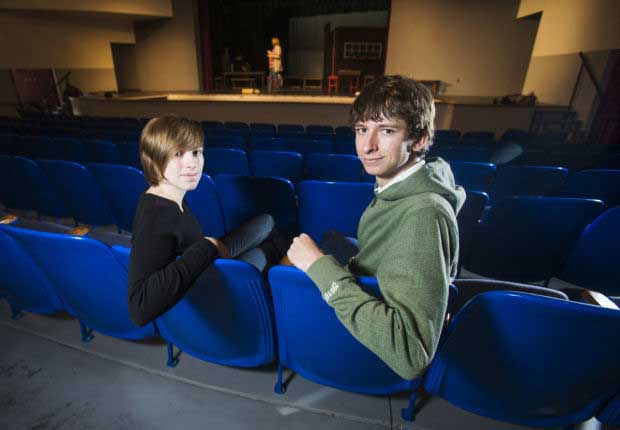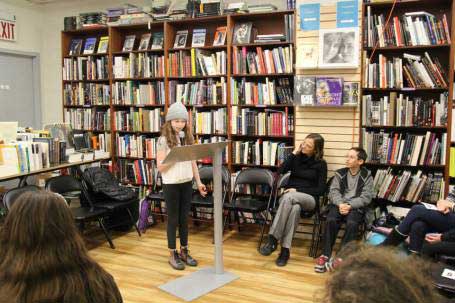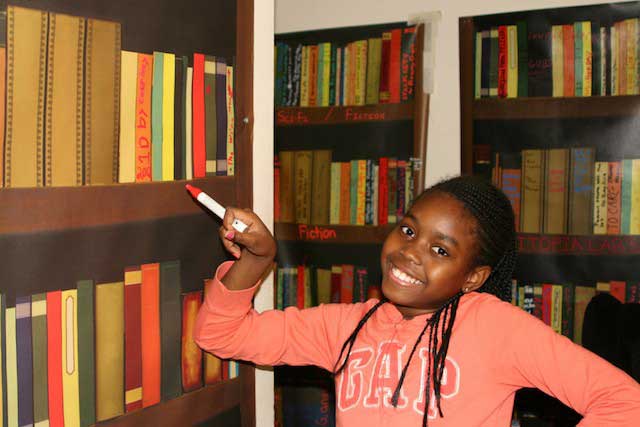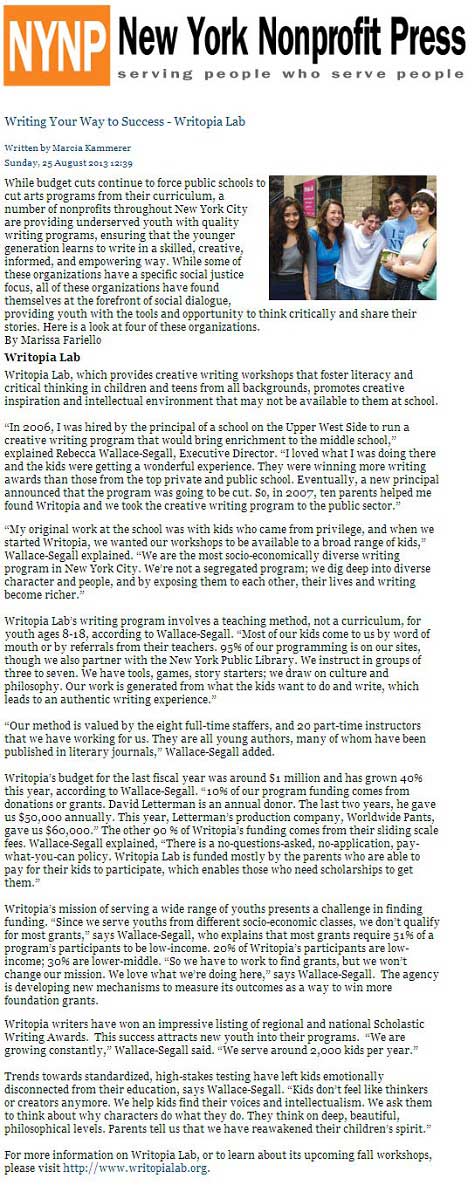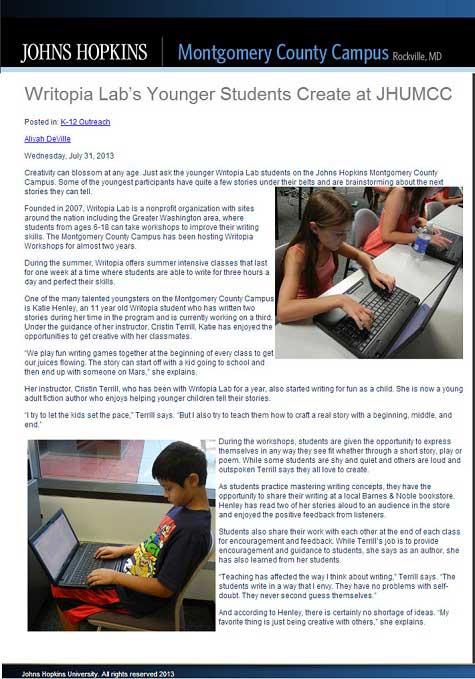Oct. 26, 2014
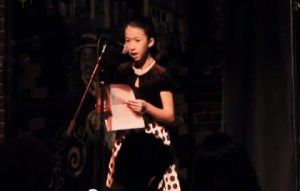
by humanities7 and Mr. Lakhaney
BSGE 7th grade Annelie Hyatt performed her spoken word poem titled, The Immaturity Dissection (full poem included below), at a recent event at Writopia's Spoken Word at the Nuyorican Poets Cafe. Annelie wrote this poem as part of a program she attends at Writopia Labs where she has been developing her writing for the past couple of years.
Annelie says that she was always into writing and then two or three years ago her mom helped her find this program. At Writopia ?there are instructors who are published authors in literary magazines and newspapers who come to teach kids who like writing once a week? Annelie explains. Each week the kids get to "sit on comfy couches and chrome book computers and at the start of the workshop you do some games or answer some prompts and then get into writing and at the end you get to share out your stories and get feedback." The poem featured in the video took her one or two days to write and then got revised. Since she started with the program she has written around 20 different stories and poems. She would recommend this program to other students who like to write.
In addition to writing and performing, Annelie interns at Writopia and works with some of the younger kids on their writing but sometimes she gets embarrassed because, as she explains, "some of them [the younger kids she works with] are taller than me so they think I'm one of the younger students. It's really embarrassing."
Eventually Annelie hopes to gather all of her written works and publish them. Here are links to two of her other performances:
https://www.youtube.com/watch?v=Fm70kmYZs5c
https://www.youtube.com/watch?v=p5HWbvBzQVE
Writopia Labs offers programs for kids aged 6-18 and according to their website, Writopia Lab is a not-for-profit organization that fosters joy, literacy, and critical thinking in children and teens from all backgrounds through creative writing.
Immaturity Dissection by Annelie Hyatt
Dear future self:
Yes, I am immature
because ignorance
is the dark matter
that makes up the universe
and you only see bodies but not
souls
and you're scared
to start believing again
because believers get hurt by society
and no one has time to dream
because the age of stories
is over
and you think you're mature
but maturity is an illusion
and adolescence
the death of not your body
but your soul
and in my world
you don't breath air
but the stuff of stars
and you can dream dreams
bigger than the sun
and no one will laugh at you
and I'm immature
with a wall
that blocks you out
because the maturity disease will not
kill me
like it already killed you
and in my world
I go on adventures
far more interesting than our lives
will ever be
and I'm sorry
that you had to miss out
on those adventures
because you wanted to get a head start in life
and I won't let adolescence break me down
because I'm stronger than adolescence
and I will shake the earth with my dreams
and I will never be forgotten
and I don't want you to be forgotten either
because money is a drug
and we're all addicted to it
and it makes the skies black
and the world smokey
and that murderer who was hired to
kill a little girl
went home to his family
and ate for the first time
in so many days
and that girl
looked down from the skies
and knew that she had made that family
so happy
and she forgave them
and that man at the store who sells those cigarettes
sells them for money
and doesn't feel the regret that used to well up in his heart
and at midnight that girl in her bedroom
wakes up
to see her mother
place a dollar bill under her pillow and throw
the tooth away in the trash
and she feels betrayed
and I might be broken down by adolescence
and my soul might die out
and I might become that ordinary adult
but believe me
there will always be a part of me that
will always believe
in you.

 Writopia Lab
Writopia Lab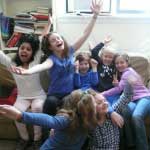 Join Genna Kohlhardt and Maddison Conforti from Writopia Lab DC for May's installment of the Northeast Library's continuing writing workshop series. For kids ages 10-13, Genna and Maddison will lead a fun creative writing workshop including warm-up games to get students inspired, writing exercises led by published instructors, and an end-of-day reading. Writopia Lab focuses on student-driven instruction, so attendees' writing will be inspired by ideas they're already interested in. Workshops provide a safe space for writers to create without judgment; students may write in whatever form they wish, and about whatever content they choose. Attendees are encouraged to bring a laptop or iPad if they have one; pen and paper will be provided. The workshop takes place on Saturday, May 10, at 2 p.m.
Join Genna Kohlhardt and Maddison Conforti from Writopia Lab DC for May's installment of the Northeast Library's continuing writing workshop series. For kids ages 10-13, Genna and Maddison will lead a fun creative writing workshop including warm-up games to get students inspired, writing exercises led by published instructors, and an end-of-day reading. Writopia Lab focuses on student-driven instruction, so attendees' writing will be inspired by ideas they're already interested in. Workshops provide a safe space for writers to create without judgment; students may write in whatever form they wish, and about whatever content they choose. Attendees are encouraged to bring a laptop or iPad if they have one; pen and paper will be provided. The workshop takes place on Saturday, May 10, at 2 p.m.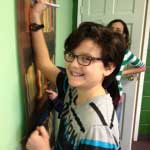 Maddison Conforti happily joined the DC Writopia team in June 2013. She graduated from DePauw University with a BA in English and Latin and has an MFA from Columbia College Chicago where she fell in love with the essay and teaching writing. Maddison's work has appeared in Eye on the World and South Loop Review. Originally from Indiana, Maddison also dabbles in literary translation and is an expert napper, wanderluster, and lover of all things Italian.
Maddison Conforti happily joined the DC Writopia team in June 2013. She graduated from DePauw University with a BA in English and Latin and has an MFA from Columbia College Chicago where she fell in love with the essay and teaching writing. Maddison's work has appeared in Eye on the World and South Loop Review. Originally from Indiana, Maddison also dabbles in literary translation and is an expert napper, wanderluster, and lover of all things Italian.